Vietnam News Today (Nov. 27): President Vo Van Thuong Leaves Hanoi For Official Visit to Japan
| Vietnam News Today (Nov. 27) notable headlines President Vo Van Thuong leaves Hanoi for official visit to Japan Vietnam treasures comprehensive strategic cooperative partnership with China: PM Cultural heritages create resources for national development Thua Thien-Hue’s cruise tourism picking up Data center, cloud computing potential as Vietnam moving digital NA Vice Chairman meets with foreign leaders, lawmakers on sidelines of APPF-31 Well-prepared Vietnam ready for U23 Asian Cup Vietnam-UK ties shine at friendship dance festival Agriculture sector responds to climate change with green development |
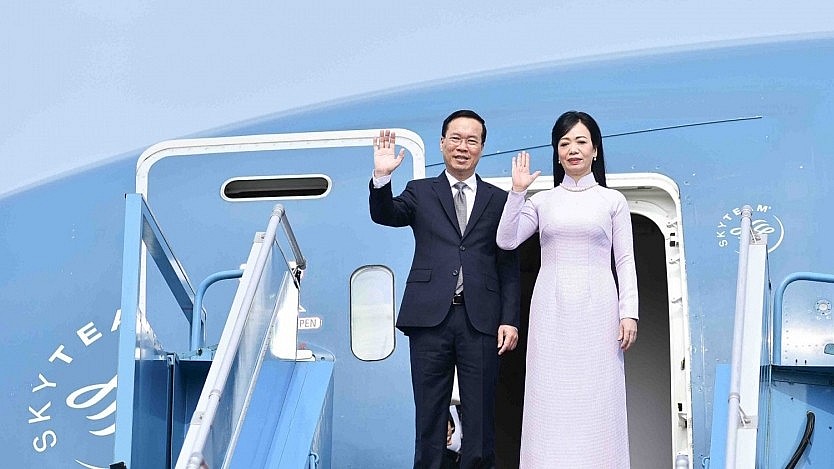 |
| President Vo Van Thuong and his spouse. |
President Vo Van Thuong leaves Hanoi for official visit to Japan
President Vo Van Thuong, his spouse and a high-ranking delegation on November 26 departed Hanoi for an official visit to Japan from November 27 – 30 at the invitation of the Japanese State.
This is the first official visit to Japan by President Vo Van Thuong as Head of State and the fourth to Japan by Vietnamese State leaders since the two countries established their diplomatic ties, cited VOV.
President Vo Van Thuong and his wife Phan Thi Thanh Tam were accompanied by Deputy Prime Minister Tran Luu Quang, Head of the Presidential Office Le Khanh Hai, Minister of Foreign Affairs Bui Thanh Son, Minister of Transport Nguyen Van Thang, Deputy Minister of National Defence Hoang Xuan Chien, Deputy Minister of Public Security Tran Quoc To and other leaders.
This year marks the 50th anniversary of both nations' diplomatic ties and nine years since the two countries upgraded their bilateral relations to an extensive strategic partnership.
Vietnam treasures comprehensive strategic cooperative partnership with China: PM
The Vietnamese Party and State consistently treasure, maintain and develop the Vietnam-China comprehensive strategic cooperative partnership, considering it an objective requirement, a strategic, long-term choice and a top priority in the country’s foreign policy, Prime Minister Pham Minh Chinh has said.
PM Chinh made the statement at a reception in Ho Chi Minh City on November 25 for Chinese Minister of Commerce Wang Wentao and a delegation of the Chinese Ministry of Commerce who are paying a working visit to Vietnam and attending the 12th Meeting of the Vietnam-China Economic and Trade Cooperation Committee.
The host and guest expressed their delight at the results of bilateral economic and trade cooperation. Since 2004, China has always been the biggest trading partner of Vietnam. Among foreign investors in Vietnam, China currently ranks fourth in terms of capital and first in the number of new projects.
In 2022, Vietnam became the fourth biggest trading partner of China in the world according to national criteria, and the biggest trading partner in the Association of Southeast Asian Nations (ASEAN). In the first 10 months of 2023, two-way trade reached almost US$140 billion.
Highly evaluating the coordination and cooperation between the two ministries of trade, especially in dealing with difficulties and obstacles in economic ties, PM Chinh proposed the Chinese Ministry of Commerce continue working closely with the Ministry of Industry and Trade, ministries and sectors of Vietnam to deploy practical measures to expand bilateral trade in a more sustainable and balanced way.
The two sides need to restore disrupted supply chains; review signed documents and study the upgrade and signing of new cooperation agreements; promote the establishment of cross-border trade areas; and enhance infrastructure connectivity to boost economic connection, including waterway and seaport connectivity and studying the building of a high-speed railway route between the two nations, he suggested.
The PM also proposed the two sides strengthen linkages and ensure the smooth flow of goods supply chains in the fields of agriculture and industry; and encourage leading Chinese enterprises with high, energy-saving and environmentally-friendly technologies to expand investment in Vietnam, according to VNA.
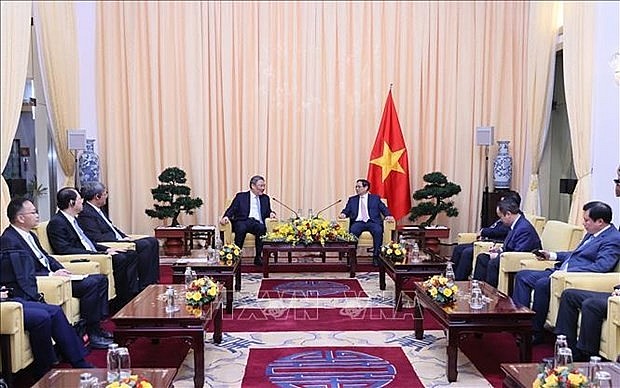 |
| Prime Minister Pham Minh Chinh (R) receives Chinese Minister of Commerce Wang Wentao. (Photo: VNA) |
The government leader also suggested China expand its import of high-quality agricultural products from Vietnam such as aquatic products and milk; assist the building of trademarks for products and fields of Vietnam’s strength in the Chinese market; help Vietnamese goods to penetrate deeper into China’s localities and retail system; create favorable conditions in customs clearance for Vietnamese goods to enter the Chinese market; coordinate with the Vietnamese side to effectively carry out trade promotion activities in each country; and accelerate the establishment of Vietnam’s trade promotion offices in Chinese localities.
In particular, PM Chinh requested the Chinese side to discuss and coordinate with Vietnamese agencies to completely settle pending issues in a number of industrial cooperation projects in the spirit of “harmonizing interests and sharing risks”.
Wang agreed with PM Chinh’s proposals and the minister said he would report them to Party and State leaders of China.
The minister pledged to work closely with the Ministry of Industry and Trade, ministries, sectors and localities of Vietnam to effectively implement common perceptions and agreements reached by senior leaders of the two Parties and nations, and deepen bilateral trade and investment ties.
Wang also proposed Vietnam continue to create favorable conditions for Chinese investors in Vietnam; enhance multilateral cooperation; and join hands in boosting regional economic linkages, including the upgrade of the ASEAN-China Free Trade Agreement.
PM Chinh took this occasion to ask Wang to convey his regards and invitation to Chinese Premier Li Qiang to visit Vietnam.
Cultural heritages create resources for national development
Safeguarding and promoting cultural heritages fulfill the cultural aspirations of the people, building an integrated Vietnamese culture imbued with national identity and generating resources for the overall development of Vietnam.
Vietnam boasts a wealth of cultural diversity thanks to its numerous ethnic groups. As each group possesses a distinct cultural identity, they collectively form a rich and varied cultural heritage. Safeguarding and promoting this cultural heritage fulfills the cultural aspirations of the people while building an integrated Vietnamese culture imbued with national identity. It also generates resources for the overall development of Vietnam.
Vietnam has 54 ethnic groups, each with its own language, customs, and traditions. Despite their differences, they come together to confront natural disasters and external threats, working collectively to develop and safeguard the nation. These diverse subcultures evolve side by side and harmonize to foster unity within the rich tapestry of Vietnamese culture.
A rich cultural heritage
According to the Department of Cultural Heritage, Vietnam’s 40,000 historical and cultural relics and scenic spots include 10,000 provincial and municipal level relics, 3,600 national relics, and 130 special national relics. Vietnam has some 8,000 festivals that celebrate local customs, practices, performing arts, crafts, cuisine, and costumes.
From a handful of museums constructed at the end of the 19th century, Vietnam has developed a modern museum system that includes 180 institutions that collectively house more than 4 million artifacts, relics, and antiques reflecting local, regional, or national culture, VOV reported.
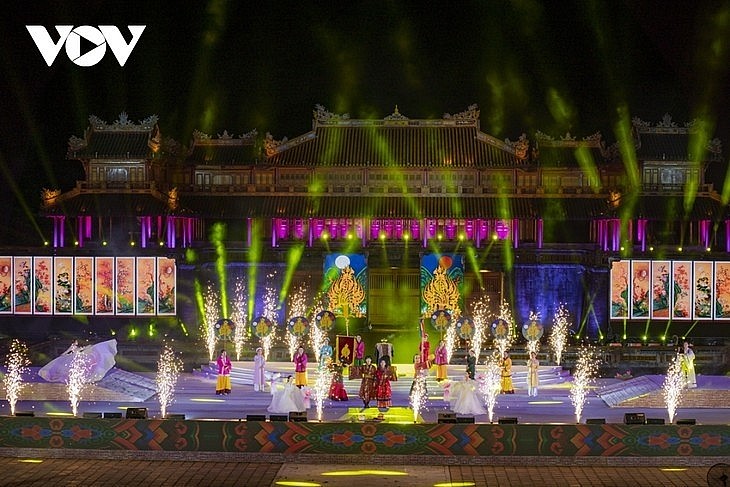 |
| An art program at the Hue Imperial City Relic Site (Photo: VOV) |
Vietnam has had 33 world heritages acknowledged by UNESCO over the past 30 years, 30 of them designated as cultural heritages. These cultural treasures are a priceless legacy left by our ancestors that attests to the enduring nature of Vietnamese culture. These heritages show to the world the visual, spiritual, and historical depth and significance of Vietnamese culture past and present.
Cultural heritage promoted
Throughout national construction and development, Vietnam has consistently recognized and valued cultural heritage as the embodiment of national identity and a valuable resource for national development. Decree 65, the inaugural decree on cultural heritage preservation signed by President Ho Chi Minh on November 23, 1945, states "Preserving cultural heritage is of paramount importance and necessity in Vietnam’s national development."
Subsequently, a multitude of legal instruments on the preservation of cultural heritage have been adopted, progressively attaining a more cohesive, inclusive, and detailed legal framework. These include the 2001 Law on Cultural Heritage, the Law amending and supplementing the 2009 Law on Cultural Heritage, and other legislative provisions to safeguard and promote the cultural heritage of Vietnam.
To adapt to societal changes, and to establish a legal framework for the preservation and promotion of cultural heritage, the Ministry of Culture, Sports, and Tourism is collecting public input on the revised draft Law on Cultural Heritage.
For this initiative, the Ministry is concentrating on three key policy areas, one of which is the mobilization of resources to safeguard and promote Vietnam’s cultural heritage.
The draft law clarifies regulations protecting and promoting cultural heritage, introduces new provisions for the "Cultural Heritage Preservation Fund," and proposes amendments to clarify the roles and responsibilities of social organizations in these endeavors. It also outlines a direction for, and adjustments to, community management and protection of intangible cultural heritages, emphasizing sustainable development and integration.
The revised Law on Cultural Heritage is slated for presentation to the next National Assembly session in 2024.
Safeguarding and enhancing cultural heritages is the collective responsibility of the people, who have a pivotal role in the protection, preservation, transmission, and promotion of cultural heritage. Communities who live in proximity to these heritages have a heightened awareness of their significance, which fosters pride and instills a sense of responsibility for their protection. The preservation of cultural heritages gives a distinctive character to tourism in each locale, which helps the economic development of Vietnam’s provinces and cities.
Culture creates a nation’s identity and is the essence of its soul. As long as the culture thrives, the nation endures.
Thua Thien-Hue’s cruise tourism picking up
The number of international cruise ships bringing thousands of tourists to Chan May port in the central province of Thua Thien - Hue began to pick up again after a long period being affected by the COVID-19 pandemic.
According to a survey by the United Nations World Tourism Organisation (UNWTO), cruise tourism is a high-revenue form of tourism, with its revenue over 40% higher than other forms such as air or road travel. The UNWTO forecast that in 2023, cruise tourism will experience a strong recovery, and Thua Thien - Hue has many advantages to tap this type of tourism.
Thua Thien-Hue’s Chan May port has the capacity to accommodate ships with a tonnage of up to 70,000 DWT and tourist ships up to 225,000 GRT. This deep-water port has been selected by the Asia Cruise Association as one of the 46 stopovers in Southeast Asia for cruise ships and large tourist vessels, VNA reported.
 |
| Chan May port (Photo: sdl.thuathienhue.gov.vn) |
Deputy General Director of Chan May Port JSC Nguyen Van Chuong said the port enjoys a special natural advantage with a 7 km-wide bay, a vast water surface area of up to 20 sq.km, and mostly natural depths ranging from 9-14m, with minimal sedimentation. The port previously welcomed large cruise ships with considerable length and tonnage, capable of carrying over 6,200 passengers and crew members. A number of domestic and foreign partners have expressed interest in joint efforts to develop the Chan May port into a destination for big luxury liners in the central region.
Since 2018, the port has welcomed numerous luxury cruisers, including Royal Caribbean, Costa Cruises, Small Cruise, Princess Cruises, Ovation of the Seas, and Mary Queen 2, affirming its brand value on the global and regional tourism maps.
Permanent Vice Chairman of the provincial People’s Committee Nguyen Thanh Binh revealed that the Aeon Mall Hue commercial center project has a total capital of over US$169 million, the largest-scale one in the central region. Operational in 2025, the project will contribute to diversifying shopping centers and services for both residents and tourists. Additionally, the province is preparing to attract investment in a large-scale shopping mall near Phu Bai International Airport.
Data center, cloud computing potential as Vietnam moving digital
The data center and cloud computing services market in Vietnam has large potential as the country is promoting digital economy development, according to the Vietnam Cloud Computing and Data Centre Club (VNCDC), a member of the Vietnam Internet Association (VIA).
According to VNCDC Vietnam is considered one of the fastest growing markets in ASEAN in terms of cloud computing and data center market, and has seen the participation of more than 50 providers, both domestic and foreign.
Cloud computing and data centers play an important role in shaping digital infrastructure in Vietnam together with broadband telecommunications infrastructure and Internet of Things (IoT) infrastructure.
The Prime Minister has approved the National Digital Transformation Programme until 2025 with a vision to 2030 with three pillars: digital government, digital economy and digital society, in which the strategy of “moving to the cloud” is considered important to help enterprises develop in a digital economy.
This provides great opportunities for Vietnam’s data center and cloud computing to accelerate and create a breakthrough, VNCDC said.
“Vietnamese cloud computing and data center companies have mastered technology, have good growth rates and are capable of competing with foreign rivals in meeting enterprises’ demand to “move to the cloud”, making Vietnam an important digital center of ASEAN,” VNCDC’s Deputy Head Dang Tung Son said.
A report by VNCDC published within the framework of Internet Day 2023 held by VIA on Wednesday in Hanoi shows that the demand for cloud computing in Vietnam doubled in 2022 to reach VND9.7 trillion.
This dramatic growth was driven by the COVID-19 pandemic which urged enterprises to speed up digital transformation.
However, the growth is slowing down in 2023 largely due to the impact of economic recession forcing firms to cut costs. Still, the cloud computing market expanded at 24.2 per cent this year.
The cloud computing market draws the participation of big domestic tech companies such as Viettel, VNPT, CMC and FPT which saw revenue increase from VND900 billion in 2021 to VND2.3 trillion in 2022 with an average growth rate of 37.4 per cent.
However, domestic providers hold a modest market share of 20 per cent while the rest is in the hands of foreign rivals.
The report predicts that the cloud computing market will grow at a compound rate of 20-23 per cent in 2023-25 period to reach US$768 million in 2025.
Regarding data centers, a report by Research and Markets shows that the data center market will grow at a compounded annual growth rate of 10.68 per cent in the 2022-28 period to increase from $561 million in 2022 to $1.037 billion in 2028.
This market is attracting huge investment from both foreign and domestic providers. Domestic names include big tech companies like VNPT, Viettel, CMC and FPT which are focusing on developing modern data centers of international standard, cited VNS.
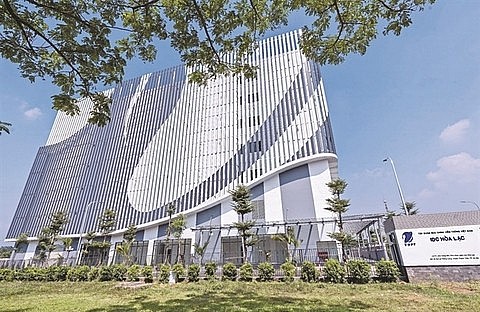 |
| A data centre of VNPT recently opened in Hoa Lac Hi-tech Park. The data center and cloud computing services market in Vietnam has high potential as the country is promoting digital economy development. Photo: VNS |
Still, domestic players accounted for a modest market share of 17 per cent.
The Government’s Decree 53/2022/NĐ-CP detailing the implementation of the Law on Cybersecurity has tightened data management, which would push up demand for data center services.
Domestic data center services providers said that the data center market would develop rapidly in the next two years, thus, they all have plans for expanding the infrastructure system.
In the digital infrastructure strategy to 2025 with a vision to 2030, the Ministry of Information and Communications set the target to expand the cloud computing market shares of domestic services providers to 70 per cent by 2025, which is challenging, VNCDC said.
At the same time, Vietnam set the goal that the digital economy would account for 20 percent of GDP by 2025 and 30 per cent by 2030. Accordingly, the ICT industry must contribute 6-6.5 per cent, in which cloud computing enterprises would contribute 1 percent of GDP.
VNCDC’s survey revealed that more than half of service providers found existing legal frameworks were supporting their development at “normal” level.
“It’s necessary to improve the legal framework for data centers and cloud computing in Vietnam to be able to compete with foreign big tech companies and create breakthroughs,” VNCDC said.
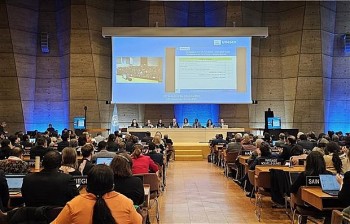 | Vietnam News Today (Nov. 24): Vietnam Elected Member of World Heritage Committee For 2023 - 2027 Vietnam News Today (Nov. 24): Vietnam elected member of World Heritage Committee for 2023 - 2027; Vice President Vo Thi Anh Xuan begins official visit ... |
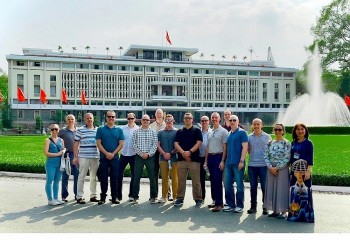 | Vietnam News Today (Nov. 25): Vietnam to Become Favorite Destination for Australian Tourists in 2024 Vietnam News Today (Nov. 25): Vietnam implements 86.7% of UPR third cycle recommendations; Hanoi, Vientiane sign numerous cooperation MoUs; Vietnam puts forth recommendations at APPF-31; ... |
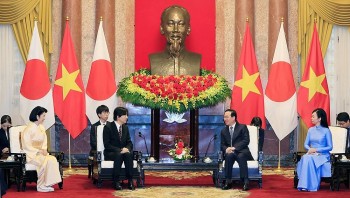 | Vietnam News Today (Nov. 26): President’s visit to Japan represents an important landmark in 50 years of diplomatic ties; Vietnam, Cuba to strengthen ties in ... |
Recommended
 National
National
Vietnam News Today (May 29): Vietnam and Hungary to Expand Cooperation into New Areas
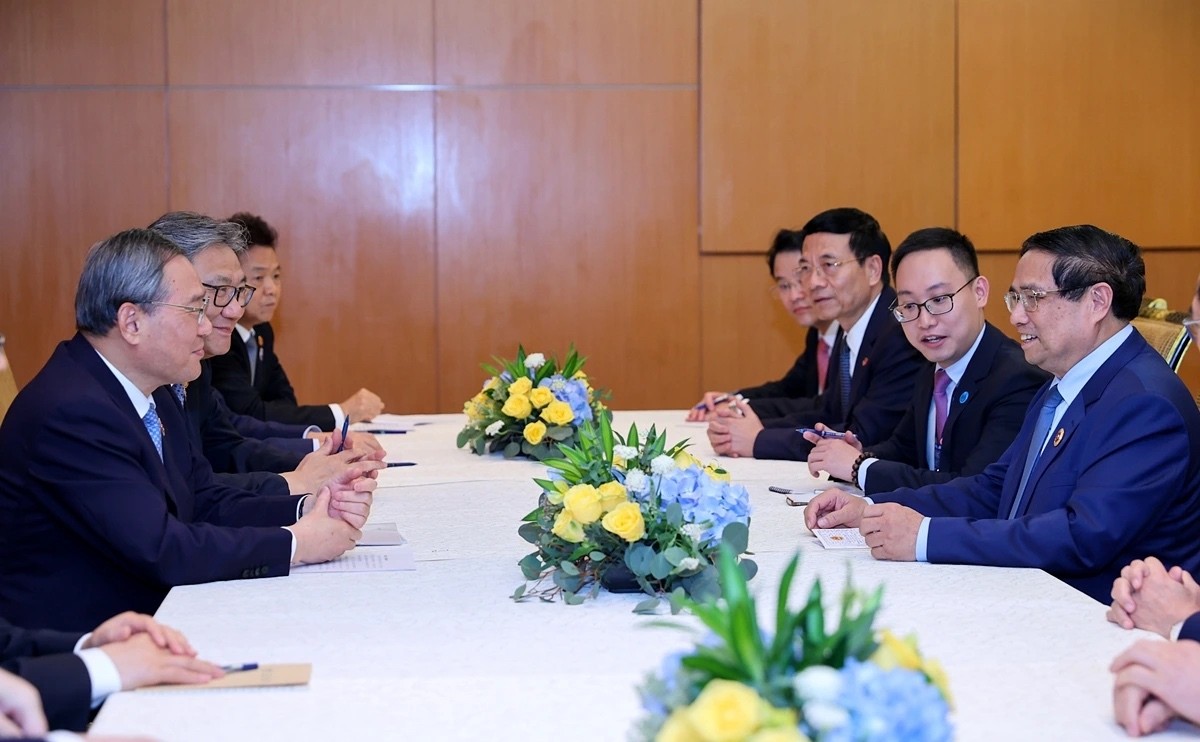 National
National
Vietnam News Today (May 28): Vietnam and China Discuss Strategic Cooperation Orientations
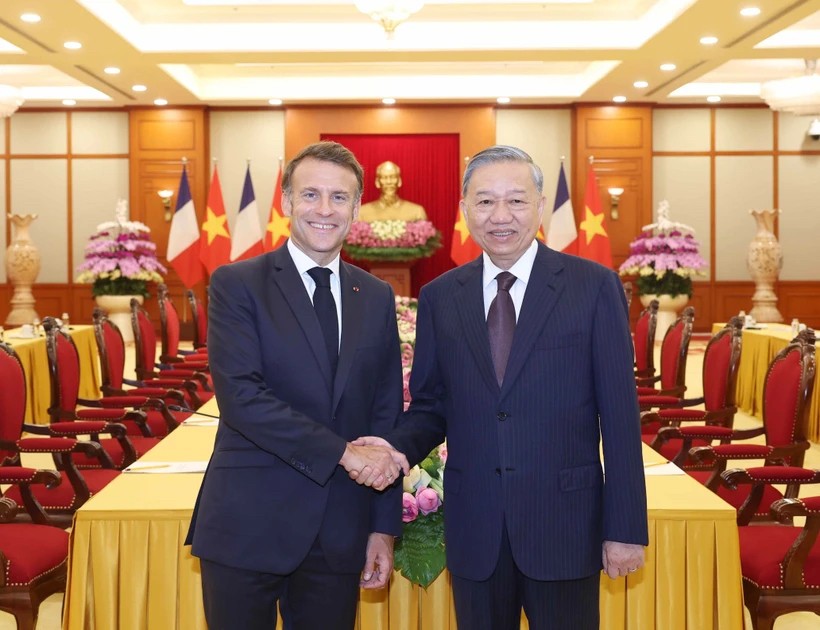 National
National
Vietnam News Today (May 27): Vietnam Treasures Multifaceted Collaboration with France
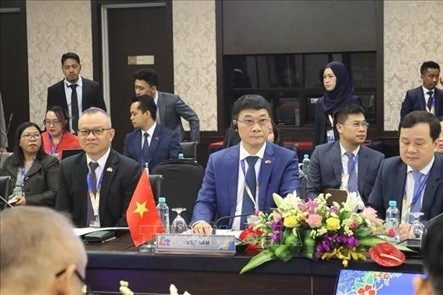 National
National
Vietnam Commits to Building an Inclusive, Sustainable and Cohesive ASEAN
 National
National
Vietnam News Today (May 31): Vietnam Strongly Supports Laos’s National Development
 National
National
Vietnam News Today (May 30): Vietnam, Venezuela Reinforce Ties Through People-to-people Diplomacy
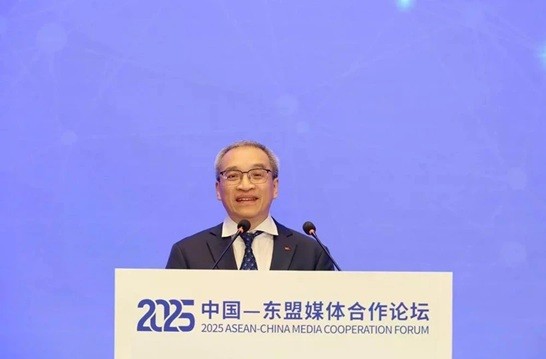 National
National
Vietnam Proposes Vision for Responsible Digital Journalism Cooperation
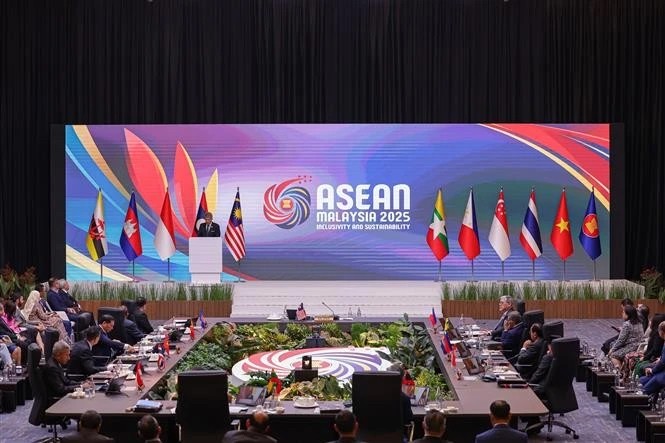 National
National


